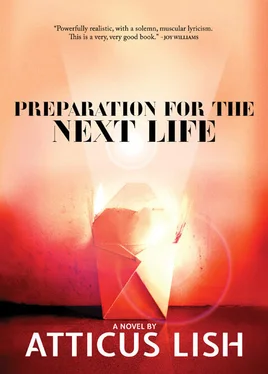I don’t have any delusions. I know it’s over for me too. My time is coming. This is the life I chose and I accept it.
The code, a version of the Enigma Code from World War II, had been identified and cracked by the Federal cryptographers. The message, which came from an individual in maximum segregation, called for the murder of staff members. The author was under twenty-four-hour surveillance, no human contact. His letter was a triumph of ingenuity.
On the main line, the staff, as always, wore vests and batons, their keys connected to their belts on a long chain that hung down out of the pockets of their green trousers like skaters. Some were female, in green bomber jackets with gold emblems, who evaluated males in animal terms: strong or weak. They had families, no illusions about their safety outside the walls.
I don’t go to areas where there’s a gang presence outside work. I don’t bring my personal life to work with me.
Jimmy lifted his foot up behind him like a horse being shod while they ran a metal detector over the flat sole of his state-issued sneaker. They felt down his clothing, his sweatshirt, the big canvas shorts.
Go, they pointed.
They waved him on and Jimmy joined what they called his family in the yard. He looked like a logger in his wool hat. It was a winter day and the sky was stratospheric blue. Expressionless, he watched the yard, occasionally turning to look over his shoulder, monitoring the other races filing out and going towards their respective camps, the whole time rubbing his hands together in wool work gloves, carrying on a laconic conversation and apparently at ease.
SHE WENT TO A store that sold South American soccer jerseys, located next to an abandoned lot and a house with a Pentecostal church on the first floor and the upper floors burned-out. The neighborhood was made up of Guatemalan families. The vans that parked on those streets, like the garage doors, were covered in a certain type of graffiti: just words, no colored pictures — just initials and numbers. MS! MSX3. MS13. GC13. Fuck S42. R2B. Niños malos. Sur 13. The Colombiana, whose sign showed a picture of a woman lying face-down with her hips raised so you could see her jeans, was five blocks away. You were not supposed to see into the soccer store. The window was covered by a flag depicting a hawk and the words Brown Pride.
The back of the store was filled with thrift store clothes in bags. The air smelled heavily of grease. A man she assumed was Mexican was eating fried pork out of a Styrofoam takeout shell. His hair was buzzed down tight all over his head the way they do in the military when they give you white walls, and a darker shadow had been left on the top of his head. He had fat cheeks like Buddha and an exact little mustache. When he lifted his lips, he had a gold tooth.
She gave him a hundred fifty dollars, which he put in the pocket of his red Adidas tracksuit jacket. In return, she got a Nebraska State ID in the name Suzy Lin Hong. Address: 1101 North Burdette Street, Omaha, Nebraska 68101. Hair: Blk. Eyes: Blk. Height: 5'2". DOB: March 3, 1979. You could see cut-off Japanese writing around the edge of her photograph.
The week after she bought the ID, the Sing Tao, El Diario, and the Pakistani Times carried the story of a worksite raid at a meatpacking plant in Greeley, North Carolina, in which ICE had detained over two hundred Hispanic workers suspected of immigration violation, separating them from their families and shipping them to federal detention centers in Pennsylvania and Texas. Zou Lei also read that American senators wanted identities to become electronic. To get a job, you would have to pass something called E-Verify.
Do you think it’s any good? Zou Lei asked, showing her ID to a woman who sold tofu cream out of a shopping cart without a license.
Good enough.
The woman, who had an out-of-state ID herself, said she had recently been arrested and sentenced to a half day of cleaning up the subway platform. Rather than being afraid of the police, she was angry with them, complaining that they interfered with her livelihood.
The cop discriminate me. I tell cop, You do your job, let me do mine.
But then a Guyanese Muslim who Zou Lei met north of Kissena Park had a different story to tell. An unshaven young man in a backwards ball cap, he was standing on the dead grass by the parking lot next to Golden City, where he had delivered jasmine rice. His truck was in the parking lot and he was smoking a cigarette.
My aunt’s husband who lives in Jersey? Forget some little ID — he had the real thing, a green card. It was in the mail and in the meantime he had the piece of paper they send you first to say that it was coming. The cops busted in on him, saying they were looking for someone else, and when they were there they asked him if he was legal. He was like, fuck yeah I’m legal, and shows them the paper, and the immigration arrested him anyway and put him in the Passaic County jail.
What happens to him? Zou Lei asked.
They fucked him up. The guards went after anyone who was Asian Muslim, Trini, black, brown, whatever — anything like Arab, because they’re so stupid and fucking racist, they think everybody with dark skin is the same. They’d come in with dogs at midnight, tear up the cell, and tear up your legal papers. My uncle has bad health and they left him handcuffed on the floor for eighteen hours before they let him go to the hospital. Then they deported him back to Guyana. It’s not like here there. Nobody has anything. They ruined his family. My aunt’s kids are in trouble. He can’t get back to the States. The lawyer told them she has to try and wait until George Bush is gone.
Zou Lei asked where he thought it was safe.
Canada! he said, throwing his cigarette away and blowing the last of his smoke out. I live in Ozone Park and there’s a lot of Hindu, a lot of Trini, but there’s no guarantee. I personally don’t have to worry, but my family has people who have to worry. I don’t know what to tell you.
Do you think I pay too much for the ID?
How much was it?
One hundred fifty.
See, everybody’s got these. The cops know they’re fake.
On a tip from the Guyanese, Zou Lei went to a two-level urban mini-mall where a crime ring was supposed to be selling counterfeit green cards. There was a nail salon and a Taekwondo school on the second floor. Spanish families took their children there to learn martial arts to protect themselves and hold their heads up. She waited around, leaning on the railing, trying to see what was what, while women got their nails silk-wrapped in the small salon. A half hour went by. A man who was working as a barker for a bar on the first floor kept observing her through his shades.
The NYPD rolled down the street, slowing as they passed. She got a feeling she shouldn’t be here. Afraid of being mistaken for a prostitute, she left. As she was coming down the stairs, the barker told her she could drink for free, why not come in? And he gestured at the open doorway of the bar, a black space behind him in which she could see nothing.
She thought she might return another day, but then she read that you could be charged with identity theft for using someone’s social, and she decided that it wasn’t worth the risk.
Ducking a turnstile could land you in federal detention. Since 9/11, the smallest offense made you deportable, depending on what country you were from. According to the World Journal, there were different classifications of countries and immigrants. Zou Lei didn’t know if she would be classified with immigrants from China, a trading partner of the United States, or with those from Jamaica, Guyana, Mexico, Egypt, Pakistan, and Afghanistan.
People said that going to English school was always a safe bet, it could only help you, you could budget thirty dollars a class.
Читать дальше












